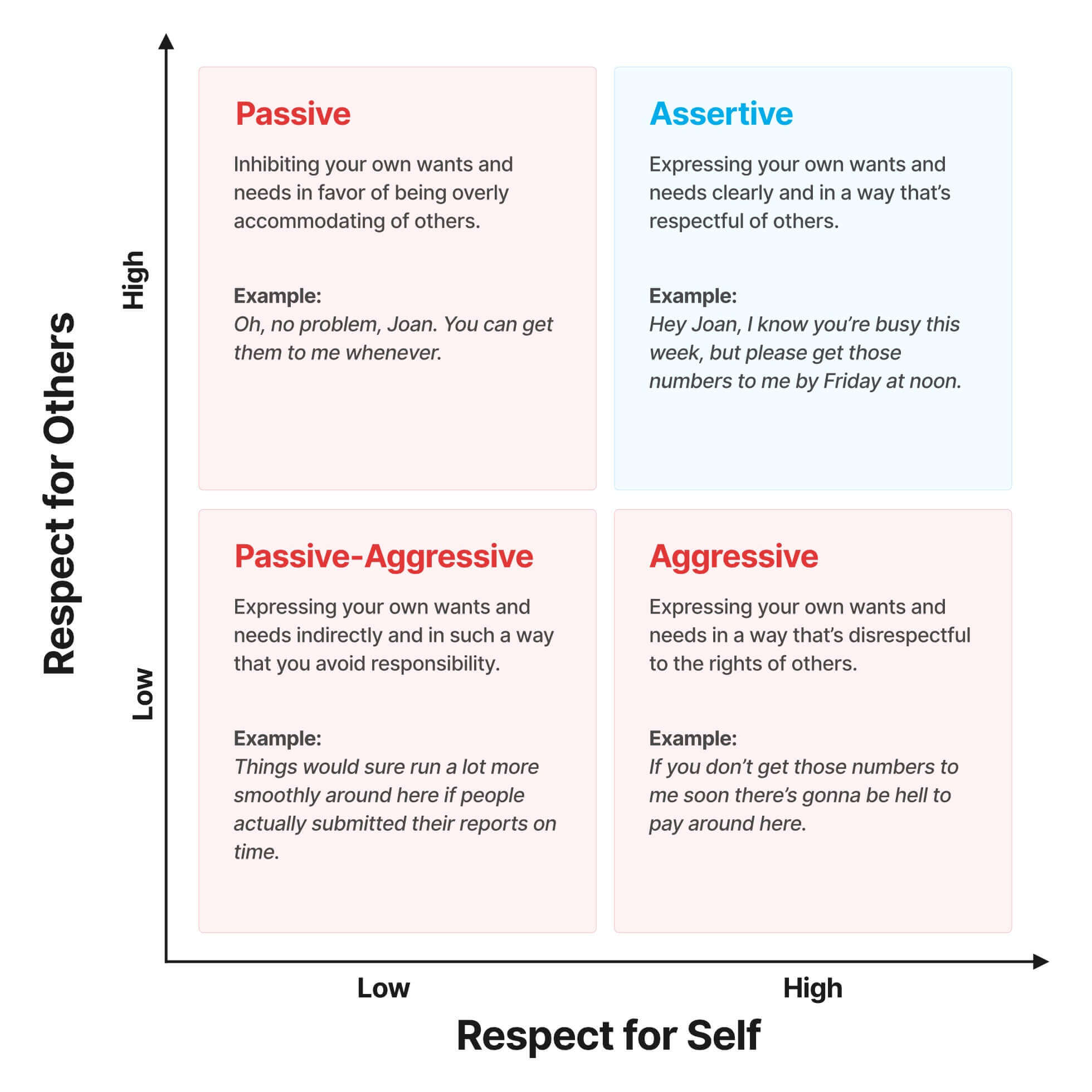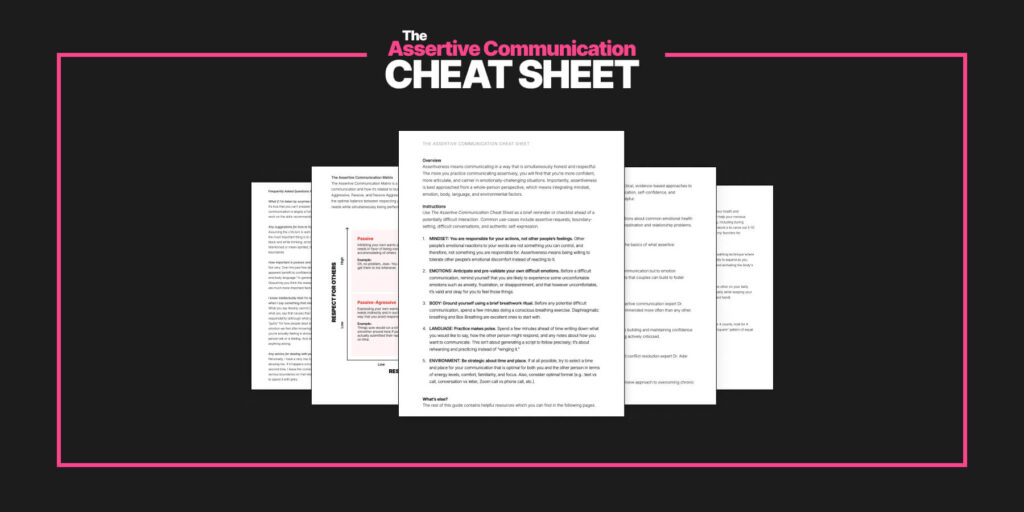🎯 What Is Assertive Communication?
Assertive communication means communicating in a way that is fully honest about your own wants and needs and respectful of the other person.
👀 Examples of Assertive Communication
- Asking for what you want. For example: Asking your boss for a raise or asking your partner to spend more quality time with you on the weekends.
- Sharing your beliefs, opinions, or ideas. For example: Sharing a political opinion during a conversation despite feeling embarrassed by it or expressing a creative idea during a meeting at work despite being worried that you’ll look dumb.
- Saying no and setting healthy boundaries. For example: Telling your manager that you can’t come into work on Saturday or saying no to a family member’s request for money.
😬 Problems Associated with Low Assertiveness
- Anxiety. Most people who struggle to be assertive end up falling into a passive style of behaving and communicating, which means being overly deferential and accommodating with others. And when you consistently ignore your own wants and needs, anxiety becomes your mind’s way of telling you something is wrong. In short, much of anxiety is a symptom of low assertiveness.
- Low self-esteem and poor confidence. When you habitually fail to act on your values, your self-esteem—which can be thought of as your reputation with yourself—understandably suffers. Similarly, if you regularly avoid challenges and difficulties because of fear, your confidence decreases with time.
- Overthinking. Because overthinking feels productive, people often use it as a way to procrastinate on or rationalize their avoidance of important but challenging goals in their life. In other words, the more you get in a habit of avoiding action, the more likely you are to go “inward” and get lost in overthinking like chronic worry or self-doubt.
- Relationship problems. When you’re unwilling to ask for what you want, express yourself, or say no and set boundaries in your relationships, you will end up resenting the other person, and ultimately, yourself. This quiet resentment is often at the heart of relationship problems like lack of intimacy and trust or constant conflict.
🌀 What Causes Low Assertiveness?
- Self-criticism and self-doubt. If you’re constantly criticizing and doubting yourself, you’ll have less confidence to communicate assertively despite feeling uncomfortable or afraid. And the less you practice assertive communication, the more opportunities for self-criticism and self-doubt you create. A vicious cycle.
- Faulty theory of emotion. Communicating assertively is a challenge because it almost always requires that you tolerate difficult emotions like fear or embarrassment. However, if you believe that painful emotions are bad, or a sign that something is wrong, you will avoid difficult emotions rather than accepting and tolerating them, which results in very few opportunities to practice being assertive communication and build confidence.
- People pleasing and reassurance seeking. Many people rely on people pleasing and reassurance seeking as their primary method of dealing with fears and insecurities. Unfortunately, both of these habits frequently involve chronically subordinating your own wants and needs to those of others, which is antithetical to assertiveness.
- Fear of disappointing others. Pursuing your values will often trigger other people to become upset. But if you can’t tolerate other people feeling upset and disappointed with you, it’s unlikely that you’ll be able to consistently act assertively.
💡 Key Insights About Assertive Communication
- Assertiveness is not aggressiveness. Aggression means pursuing your wants and needs while violating the rights of others. And assertiveness, by definition, means always being respectful of the rights and autonomy of other people as well as your own. NOTE: See the assertive communication matrix in the next section for more details on how assertive communication differs from other forms of communication.
- Assertiveness is about you, not other people. Assertive communication is not fundamentally about other people. And it’s certainly not about trying to control or manipulating other people. In fact, the opposite is true: Assertive communication is about taking responsibility for yourself, your actions, and your values regardless of how other people behave.
- Assertive communication is a skill, not a personality trait. While our basic temperament and personality may influence our tendency to be assertive or not, ultimately assertiveness is a skill that anyone can cultivate. But like most skills in life, it requires practice and patience. Specifically, it requires that you are able to be aware of and tolerate difficult emotions rather than trying to cope with or avoid them.
📊 The Assertive Communication Matrix
The assertive communication matrix is a simple visual guide to understanding the difference between the four fundamental communication styles: assertive, aggressive, passive, and passive-aggressive:

🛠️ Tips and Tools for Improving Assertiveness
- Improve your emotional resilience. Very frequently it will feel scary to communicate assertively. If you can’t tolerate that fear and be assertive anyway, your assertiveness will decrease rather than improve. Building emotional resilience is essential if you want to feel more confident with assertiveness.
- Avoid fake guilt. Often the biggest obstacle to assertive communication is guilt. Or rather, it’s the fear of feeling guilty because someone else might become sad or angry after you communicate assertively. But that’s not actually guilt. Guilt is the emotion you feel when you knowingly do something immoral. Feeling guilty even though you’ve done nothing wrong is fake guilt and you shouldn’t let it stop you from being assertive. Remember: You are responsible for your actions, not other people’s feelings.
- Clarify your values. It’s important to remember that despite assertive communication often feeling uncomfortable or scary, we’re doing it for a reason. We’re setting boundaries on work so that we can protect our mental health, for example. Or maybe you’re expressing yourself with your partner because you value honesty and trust in relationships. When you make time to clarify the why behind your assertiveness—your personal values—you will feel more motivated and confident to communicate assertively despite the discomfort.
📝 The Assertive Communication Cheat Sheet

The Assertive Communication Cheat Sheet is a free 5-page PDF guide I put together that summarizes my favorite tips for communicating assertively, plus answers to common questions, and extra resources and tools.
